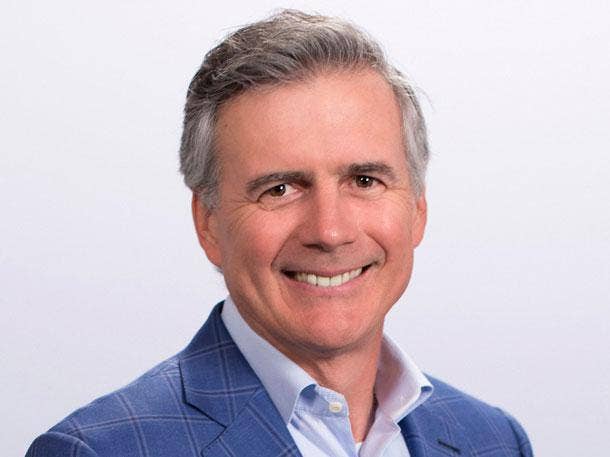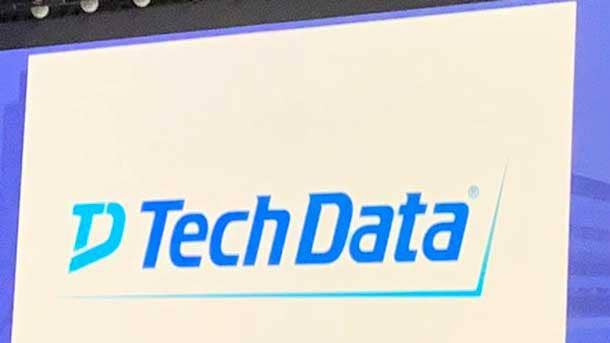Tech Data CEO Rich Hume On The Apollo Deal, $750M Digital Transformation And ‘State of The Art’ StreamOne Platform
‘StreamOne will be white labeled to the reseller community, meaning that all of our capability can be used by our resellers with their brand on the capability as they engage with their end users,’ says Tech Data CEO Rich Hume. ‘We're at a time here where there's a fork in the road as it relates to the type of tools, processing and capabilities that resellers and solution providers and MSPs will need. You should think about this $750 million investment as a big down payment in being able to bring that capability to market for them as they look at bringing their solutions ultimately to their customers and to the rest of the market.’

A New Day At Tech Data
Clearwater, Fla. distribution giant Tech Data – which this week closed a deal with private equity powerhouse Apollo Global Management to take the company private – is gearing up for a massive second half of 2020, with a $750 million investment aimed at digital initiatives around cloud, core business capabilities and better data and analytics.
“Traditionally, a lot of business was done through the business partner ecosystem, face-to-face,” CEO Rich Hume told CRN. “Now many people are being very innovative as it relates to sales engagement and proposals virtually. It’s different. We’re all learning. I think under the circumstances, the business partner ecosystem is really shining and getting accomplished what our customers need us to … It’s just awesome to see the work that gets done across the entire business partner ecosystem.”
Since March, the distributor has helped thousands of partners deliver IT goods and services through a pandemic and constantly shifting travel restrictions and moved workers remote, while also managing their own businesses. Hume said the last few months Tech Data employees stepped up to deliver the best possible outcomes for customers.
“The one thing that really impressed me is how agile and resilient 15,000 Tech Data colleagues can be throughout the world,” Hume said. “Flipping the light switch and in days going from everybody on-prem to off-prem and seamlessly being able to carry on with business, and then ensuring that our logistic center colleagues were all kept safe and had a good environment to work in, such that we could meet the essential needs of the market at that point, namely, remote work.”

How did this deal come together?
We've had an ongoing relationship with Apollo for a number of years. We stayed in contact and they'd always had a lot of interest in our business and when this deal ultimately got done in the November time frame, we spent a lot of time together prior to that and Apollo, they're really, really smart people so they spent a lot of time on our strategy and they spent a lot of time understanding what we felt was important strategically for the future.
I was asked earlier, ‘this $750 million dollar investment, how long were you contemplating it’ and the reality is we've been talking about it since September, or October of last year. It's been an ongoing theme. We understand the base business quite well, but how do we make sure that you remain vital to the business partner ecosystem and vendors moving forward.
The announcement of the $750 million has been an accumulation of an eight or nine month discussion, in terms of how we're going to reposition the business.

How is Tech Data putting that investment to use?
As it relates to the big towers of investment, think of it in three major buckets.
The first is we intend to have state-of-the-art platforms available for our customers. What I mean by that is you're familiar with StreamOne. We've been investing in StreamOne in earnest. That being said, we believe there's a lot of requirements which are emerging, and continue to emerge that will really allow us to differentiate ourselves, so we'll we'll be accelerating investments in StreamOne.
The second is our overall core business process in capabilities and tools that surround, if you will, the core environment. That’s going to be refreshed top to bottom with state of the art, edge capabilities, and a very, very resilient business backbone.
The third tower is using analytics and data to assist in better outcomes for customers and vendors as well as Tech Data, as part of the overall digital infrastructure.
We've had a journey of being quite digital today, but technology is advancing and we’re pushing everything to state-of-the-art. That's the way to think about it.

It has been mentioned before that going private is going to give Tech Data more flexibility around projects. Can you talk a little about that?
To start we've talked about the biggest one and that is we'll be able to accelerate and advance by years, that capabilities and the it's the overall strategy and the capabilities that we’ll be able to make for customers.
When you're in a public environment, you obviously lay down an investment plan but you’re balancing your earnings outcomes to try to provide, tactical returns as opposed to thinking about what is best for the long-term, so you're not inhibited by that.
In a public setting as well when things emerge which are unanticipated, industry changes or the pandemic that we're in the middle of, might require sort of a rethinking or an elongation of your investment cycle, and in this instance you're not hampered by that. I'd say by by a large measure that's it. The team lays down a plan, gets focused, executes and obviously is accountable to deliver results but, the entire process is uninhibited by the short-term speed bumps.
You just stay wed to what it is you want to accomplish and get it done on a much more expeditious schedule. That’s really the big one.

Private equity deals are sometimes highly levered, but I know Apollo Global Management has said that is not the case here. Can you talk a bit about how the financing of this deal is going to give you more flexibility?
The typical paradigm for private equity firm acquiring an asset is to borrow a lot of money and take a high leverage position, and use very little of their money when they do it.
And typically there is a ratio of debt to earnings and, those ratios, can generally speaking run five six or seven. But what is different about this deal is Apollo had decided that they would take a very low leverage approach to the deal. And so rather than that five, six, or seven times of debt to earnings, they're more in the mid-two type of range. In the mid-two type of range is where Tech Data has always run. It's considered sort of an investment-class capital structure. And so it's important for the channel ecosystem to know that this structure gives Tech Data a very significant amount of liquidity.
It kind of positions us from a capital structure place to the way we've always been, but it provides a lot of headroom for organic investment or future use of of capital, or even acquisitions where they might make sense. So, its really a unique structure and it's it's important that that that people understand that.

During the virtual Tech Select show last week, the company talked about the enhancements to the StreamOne platform and how it would allow MSPs to sell their own solutions to other Tech Data partners. Can you talk about the potential that you see there?
We would be underselling what we're trying to accomplish if we called StreamOne a “cloud platform.” StreamOne will be a solutions aggregation and orchestration platform. What I mean by that is, having the big infrastructure providers in the platform Amazon Web Services, Microsoft Azure, IBM Cloud and Google, those things unto themselves are really interesting technologies, but not sufficient to bring business value.
What's as important is the ecosystem that surrounds those foundational capabilities. All of the ISVs participating in in the platform, allow us to derive more significant business value.
And so yes, we are recruiting and actively bringing on many ISVs. As managed services providers create their own IP and solutions, they'll be able to bring that content to StreamOne and be able to market and sell that content, as we as we build out our platform capability.
So it will be a not just a uni-directional, vendor to distributor to reseller, but the MSPs and those within the business partner community that are creating solutions will be able to market.
So simple example, if you're a solution provider that's created some IP on the East Coast and you want to expand the ability to sell your offering, within our solutions aggregation marketplace it can be consumed anywhere throughout the United States.

When will those capabilities go live?
StreamOne is live today and the capabilities build through time.
A lot of the content that we were just talking about will clearly come within the coming year. We're going to create a build phase and then maybe later on in the year we'll see a time when all that content is going to be uploaded and ready for sale.
So as the capabilities get greater and greater, as the interest and demands grow, there'll be more folks boarding through time.

StreamOne has also undergone or is undergoing a remodeling, down to the code, is what they said during the panel. What are some of the other enhancements?
One of the other big benefits of StreamOne as we look at our plan here is that StreamOne will be white labeled to the reseller community, meaning that all of our capability can be used by our resellers with their brand on the capability as they engage with their end users.
We're at a time here where there's a fork in the road as it relates to the type of tools, processing and capabilities that resellers and solution providers and MSPs will need.
You should think about this $750 million investment as a big down payment in in being able to bring that capability to market for them as they look at bringing their solutions ultimately to their customers and to the rest of the market.

When you talk about using the $750 million to reposition Tech Data for digital transformation, it always seemed that Tech Data was already positioned to enable digital transformation, so could you expand on that?
Absolutely. That’s been part of our journey and we're very digital today, however there's very meaningful additional capabilities and changes. I'll give you one example. A lot of the work across the business partner ecosystem has to do with bidding and proposal cycle, or the visibility as it relates to deliveries, etc.
We're working closely with our vendors to very much automate those processes and take the cycle times down significantly so automating order visibility all the way through from the reseller, back to the vendor, automating the bidding proposal cycle, automating all of the updates that go along with that when configuration changes happen.
There’s a lot more valuable things that the entire ecosystem can do as we deploy these automation tools and digital capabilities to really drive a better experience on a much faster cycle time as we as we move forward. It's a continuum, digital transformation. Certainly we're very digital today but we see a lot more opportunity to advance with customer experience being at the forefront of all that we do.

We talked back in March about what MSPs needed in that environment. Now, what are you hearing from those partners, the MSPs, the solution providers, the VARs? What do they need from distributors in today’s environment?
Well certainly cloud solutions are something that are hot right now so, we have solutions factories that aggregate the different piece parts of building out different solutions. Maybe its Microsoft Azure with Red Hat components or capabilities, so we're building and validating solutions and in being able to sell in that context. I do believe, if you want the broader market view, that we've seen phase one of remote work. I kind of described phase one as being
‘Okay, we gotta move everybody home and we gotta make sure that they're operational.’
I think, most companies now are in the process of concluding that their workforce footprint is going to change, and there's going to be more remote work as we move into the future.
And so now they're beginning to think about ‘Okay, I have them up an operational in their home but they’re not optimally productive, so what do I need to make them optimally productive? Is it more bandwidth? Is it more displays? Is it, a home workforce footprint that we need to deploy for our telesales resources. I believe that the that we're going to see continued demand driven by remote work as it moves into more of the sustaining phase.
Then of course as we move through time there's been a bit of a pause overall in, I’ll call it the data center category. As businesses begin to run out of capacity or need to innovate in order to drive productivity, there'll be a requirement for data center to start being a bit stronger than it might have been in the tactical frame.
Then lastly if you look at all of the surveys. When companies are asked about innovation and whether they're going to delay (moving ahead), the overall resounding response is ‘Given where we're at, we're going to accelerate innovation.’ When we get into the dialogue of innovation, technology is always at the forefront. With the intention of accelerating innovation, I believe that maybe not today or tomorrow, but we'll see, the technology sector -- which we’re a vital link within that chain -- be able to take advantage of.

What have been some of the lessons learned, as a CEO over the past few months, wading through these uncharted waters, so to speak?
I think this maybe a little bit of motherhood and apple pie, but the one thing that really impressed me is how agile and resilient 15,000 Tech Data colleagues can be throughout the world. Flipping the light switch and in days going from everybody on-prem to off-prem and seamlessly being able to carry on with business, and then ensuring that our logistic center colleagues were all kept safe and had a good environment to work in, such that we could meet the essential needs of the market at that point, namely, remote work.
And I think that we all come together and help each other through the ecosystem as I told you before, when times are tough to really help resolve issues such that people can move forward and serve their customers.Those would be the two lessons number one is the agility and resiliency of our colleagues, and then number two is the importance of treating every request from a customer as a high-priority request because the battlefield sort of shifted and it was not business as usual.So a big, big focus on customer experience and making sure that we're were assisting in getting those end user needs met.